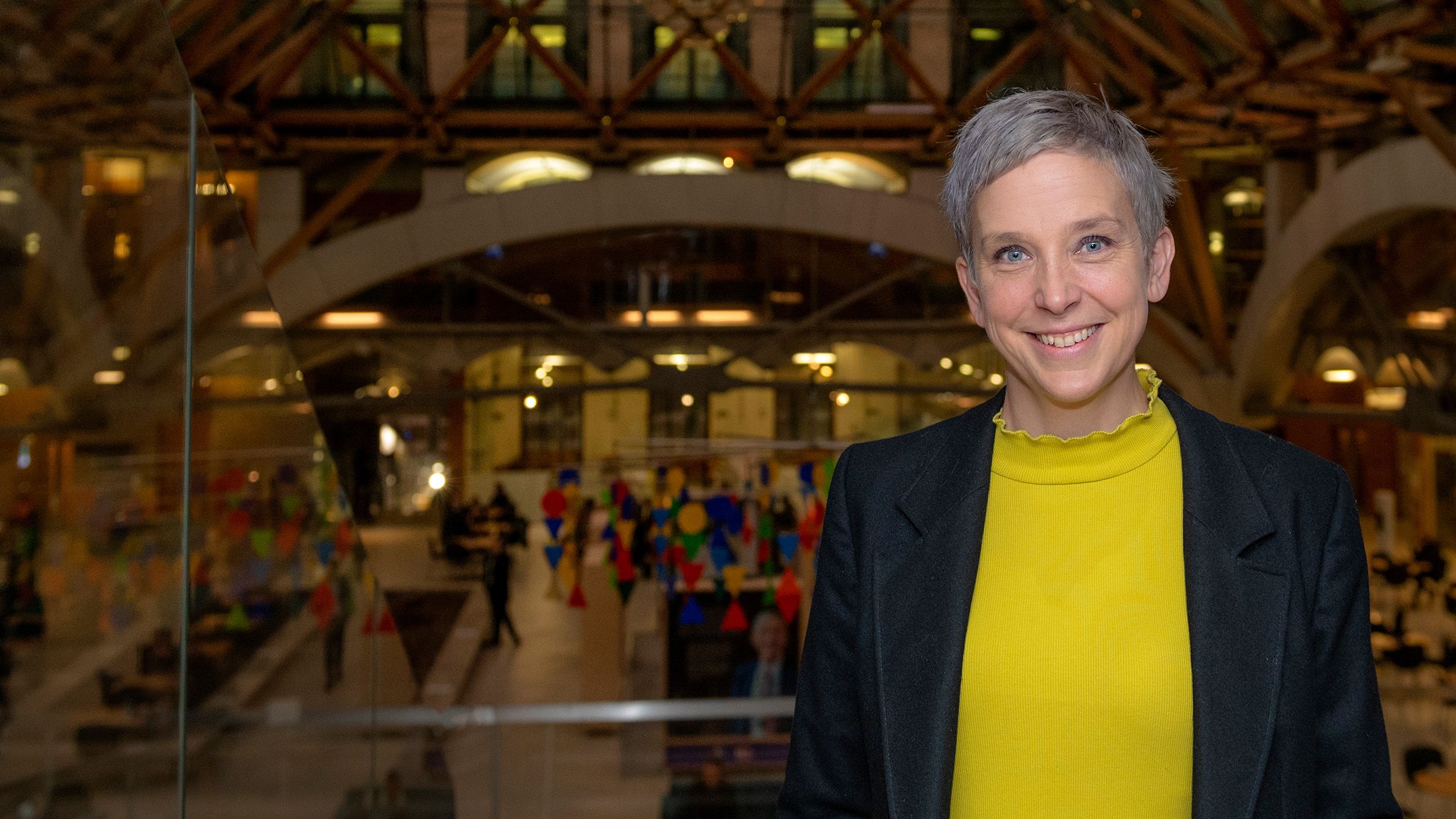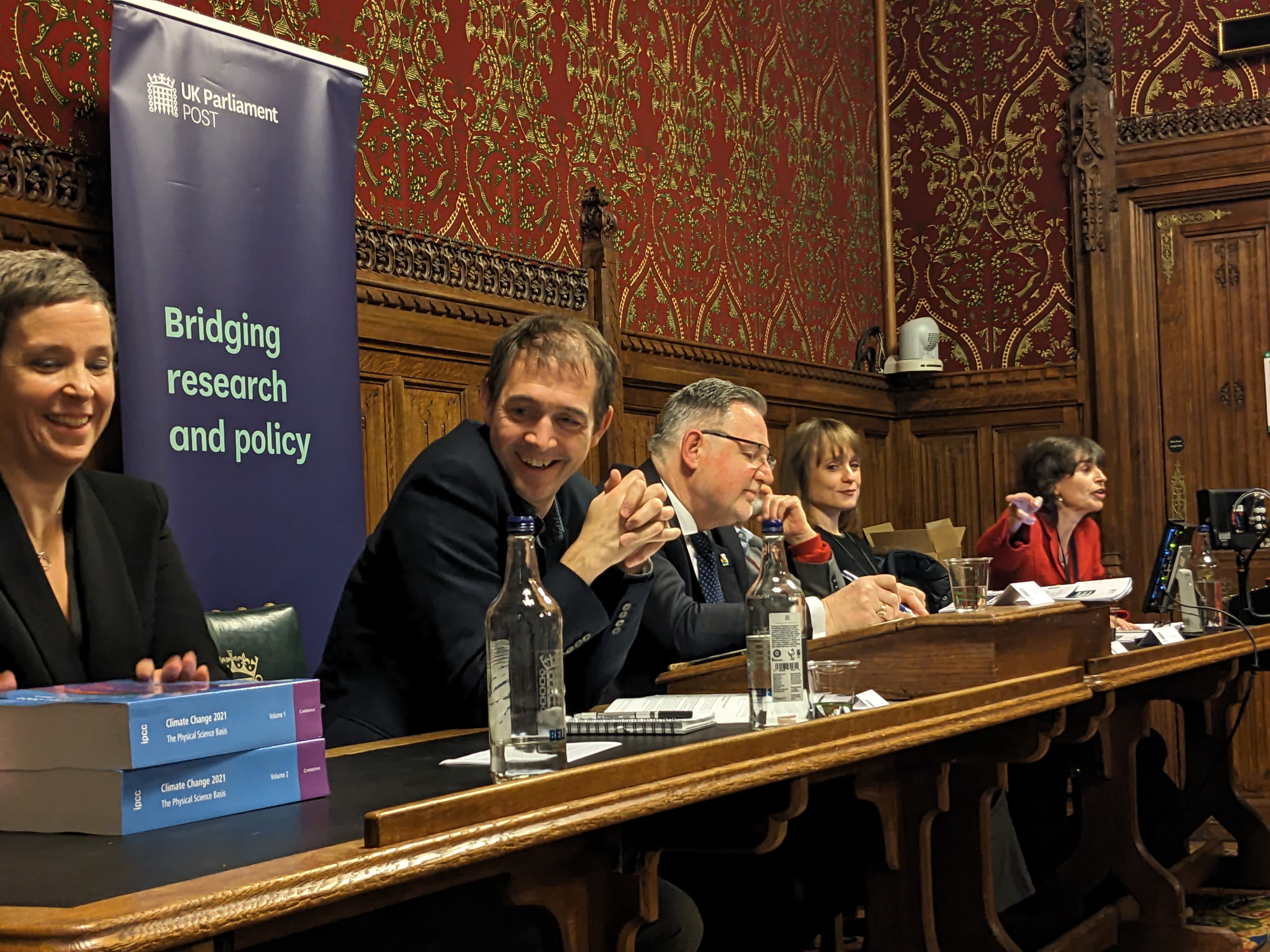Tamsin Edwards: A year as Thematic Research Lead in Parliament
Hear from Thematic Research Lead for Climate and Environment Prof Tamsin Edwards on her work bringing research into Parliament.

What is a Thematic Research Lead?
Thematic Research Leads (TRLs) are mid-career researchers embedded three days a week in Parliament.
The Thematic Research Lead network was started in 2023 to facilitate and enhance the use of research evidence and expertise in Parliament (both in the House of Commons and House of Lords) through effective knowledge exchange and collaboration. Each TRL leads on a specific policy area.
To achieve this, they conduct three primary activities:
- strategic support for the production and delivery of research evidence for Parliament, within a broad policy area
- activities to support the development of a research and innovation landscape that facilitates and encourages knowledge exchange between Parliament and the research community
- participation in a network of Thematic Research Leads to share intelligence and insights across policy areas.
There are currently three TRLs working in Parliament, covering the policy areas of international affairs and national security; climate and environment; and Parliament, public administration and constitution.
Meet Tamsin
Prof Tamsin Edwards is Professor of Climate Change at King's College London, as well as being the first Parliamentary Thematic Research Lead for Climate and Environment.
An expert in uncertainty for ice sheets and glaciers, Tamsin is also a Lead Author of the Intergovernmental Panel on Climate Change (IPCC).
"Being a Thematic Research Lead has been transformative. Not only have I participated in the workings of Parliament – such as advising cross-party scrutiny of Government policies on climate and environmental science by Select Committees, or writing House of Commons Library briefings for MPs and peers on COP28 and UK progress to net zero – but I’ve also had the opportunity to bring change."
Read on to hear from Tamsin about her work and experiences as a TRL in Parliament.

Working as a Thematic Research Lead
As a Thematic Research Lead, I’ve had a lot of freedom to choose how to develop the role of climate and environment research in the work of Parliament. We were all immediately put in positions of leadership and trust: so I’ve not just been collaborating on evidence briefings for Select Committees and the libraries, but also designing and running my own events and training sessions, writing editorial pieces, and working with parliamentary staff and academic networks to develop new processes for sharing diverse expertise and knowledge. I’ve enjoyed exploring channels through which to build understanding between, and within, the two communities.
I’ve worked with a variety of teams and individuals across Parliament – getting to know what they do, and helping with their work. Over the past 12 months, I’ve worked closely not only with the parliamentary bodies that produce evidence briefings and answer Member enquiries, such as the House of Commons Library and Parliamentary Office of Science and Technology, but also with Select Committees responsible for scrutiny on climate and environment, including individual MPs and Members of the House of Lords and the staff that support them, as well as a range of other people connecting Parliament’s interests through All-Party Parliamentary Groups and networking events.
Parliament has very collaborative ways of working – from the cross-party membership of Select Committees, who work together to scrutinise the effectiveness of climate and environmental legislation despite their political differences, to the collegiate and helpful staff, who are always more than happy to share their advice and extensive knowledge.
A big part of this role has been learning how to make decisions with broad consultation and consensus – this is quite different from academia, which often rewards the solo expert striking out independently, but I’ve found it a much more effective and ultimately productive way to work. It’s all about bringing people along with you in your ideas, and delivering something that people really want and need, rather than just forging ahead on your own.
Parliamentary staff already do an absolutely tremendous job at informing Members of research evidence, with incredible breadth and depth of expertise, but they’re always keen to strengthen their processes of knowledge exchange and horizon scanning even more. As I still work in a university (I split my week between being a TRL and a Professor at King's College London), I’ve been able to act as a bridge between research and policymaking. I’ve brought my national and international networks to introduce a more diverse range of academics to the work of Parliament, and by being embedded in Parliament I’ve been able to represent the academic community and talk to staff there about our different challenges and ways of working.
All this means I’ve mainly worked outside my specific area of expertise, making use of my wider knowledge of climate and environmental research and how it can be effectively communicated. Being a TRL is therefore closer to the broad role of a Chief Scientific Adviser in a Government department than to the Specialist Adviser role of academics helping with specific Select Committee inquiries.
Being at the forefront of this change in Parliament - as one of the first TRLs - has been incredibly exciting and rewarding. I have learned a huge amount: not only about Parliamentary processes, which has been fascinating, but also how to work effectively across different disciplines and with people that have a wide variety of expertise, priorities and values.
Are we too late? Climate change assessment ahead of COP28
One of the larger pieces of work I've done this year was putting together an event, Are we too late? Climate change assessment ahead of COP28, with panellists including the Chair of the Intergovernmental Panel on Climate Change (IPCC), senior academics in climate research who were also IPCC authors, and parliamentarians Barry Gardiner MP and Baroness Parminter. We had around 60 attendees in a committee room in the Palace of Westminster, participating in a lively discussion and sharing a diverse range of perspectives and questions.
Producing an event in Parliament was a unique experience. Listening to the discussions, it felt good to have been able to get IPCC authors, parliamentarians and parliamentary staff in the same room to talk about the evidence and the priorities of the IPCC and policymakers. Having MPs and Members of the House of Lords both on the panel and in the audience meant that the discussion was grounded in real-world policy and interests, and underlined the essential role of research in the democratic process - not least because Members had to temporarily leave the session for a vote in the Chamber (twice!).
I tied this all in with a piece in The House Magazine on IPCC climate assessments, and co-authoring new Commons Library briefings on COP28 and The UK’s plans and progress to reach net zero by 2050, timed so that I could distribute them at the event. I also put on a training session for staff before the event, called Navigating the IPCC reports, so they would be better informed about the content and unique value of these vast, complex assessments of the evidence.
Take a look at the links below to find out more!


What next?
In my remaining months as a TRL, I'm planning to focus on the other side of that research-policymaking 'bridge': exploring what I can do to help academics engage with Parliament. I’ve already connected the UK Universities Climate Network (UUCN) with parliamentary colleagues, so they could distribute opportunities to engage to the community. I’m now starting to work on developing training for researchers to give them the skills and confidence to submit oral and written evidence to Select Committee inquiries.
Beyond my time as a TRL, I'm excited to take what I’ve learned into my future career. As well as understanding policymaking and scrutiny in both the UK and Scottish Parliaments, extending my knowledge and connections across new areas and institutions, and refining my skills in clear, impartial communication, the role has given me new insights on how to collaborate and consult with a wide range of people – from the administrative staff that make Parliament run, to the peers and ex-ministers with decades of experience in policymaking. That experience of learning about policy and people will always stay with me.
Find out more
Applications for the 2024-2026 TRLs have closed. Sign up to the Knowledge Exchange Unit weekly round-up to receive a wide range of engagement opportunities including fellowships, future Thematic Research Lead positions and other opportunities for experts and researchers such as contributing to Select Committees and POSTnotes.
This page was produced by the Knowledge Exchange Unit, part of the Parliamentary Office of Science and Technology. Find out more about us.